On The Record with Loren Bertocci; What’s Going on Under Water Doesn’t Matter
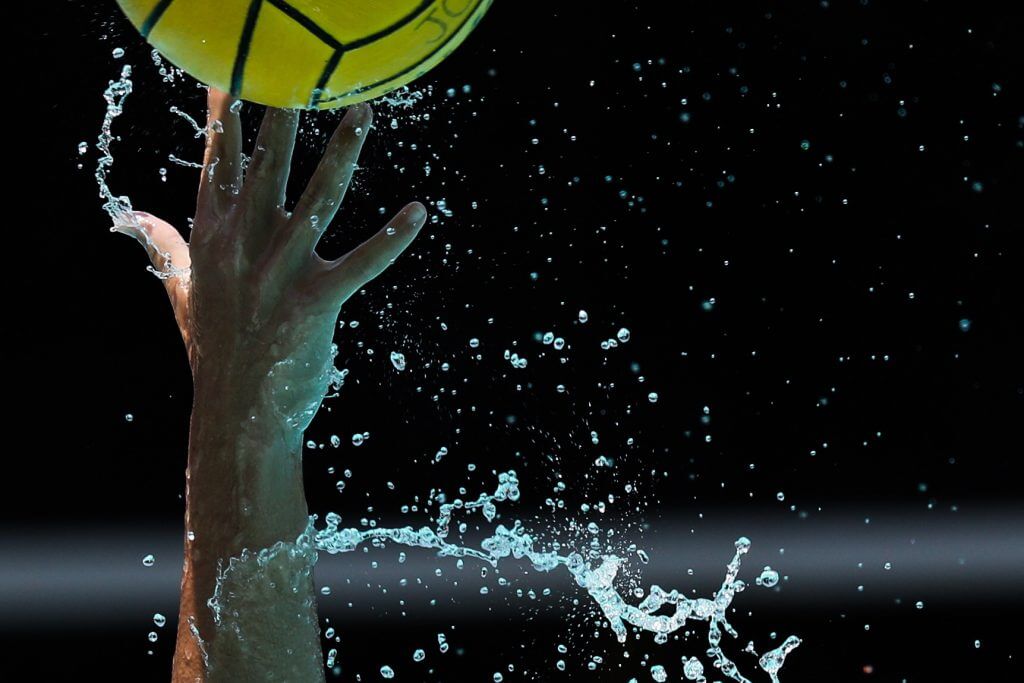
By Michael Randazzo, Swimming World Contributor
Though he hasn’t donned a referee’s whites in almost a decade, Dr. Loren Bertocci’s influence on water polo—both in the U.S. and abroad—remains pronounced. FINA’s Technical Water Polo Committee is considering a host of rule changes to the international game, with Mark Koganov—whose highly-decorated career includes officiating men’s and women’s matches at the 2016 Rio Olympics, began under Bertocci’s tutelage—as one of the TWPC’s key decision-makers. In the U.S., Bob Corb, NCAA Water Polo National Coordinator of Officials, is currently spearheading a campaign promoting athleticism, not physicality, as the sport’s dominant feature in America.
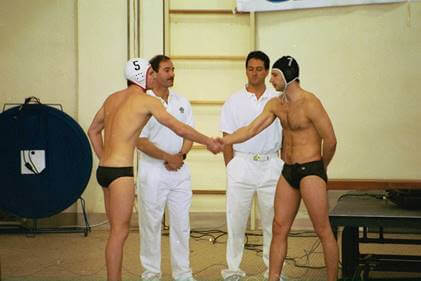
Loren Bertocci (left) and Joe Peila in undated photo
All this change speaks the language of polo that Bertocci not only knows best, but has passionately advocated for decades. First introduced to the sport in the early 1970s, a young Bertocci was quickly swept up by polo, becoming coach, referee and teacher, ultimately rising to one of the most prestigious positions in the sport as a FINA-certified referee. He wielded enormous influence as USA Water Polo’s first-ever National Referee Chair as well as Technical Director—and Head Referee—for the Collegiate Water Polo Association. His connection to and passion for the sport has been mirrored by his wife Joan, one of the guiding lights of Water Polo Planet, still one of the world’s most influential outlets for polo.
Swimming World spoke recently with Bertocci, now Director of Marian University’s Program in Exercise and Sports Science, about his expansive views of the variety of ailments currently besieging polo—and what may cure its many ills—as well as his enduring passion for a sport where the referees are not only essential participants in an astounding, physical activity, but whose influence at the present moment may determine the continued viability of the Olympics’ oldest team sport.
You’ve been involved with water polo for much of your adult life as a player, referee, teacher and coach.
My introduction to real water polo was my first year at Stanford. I initially played intramurals and then club and then one thing led to another. It got to the point where I played on a club team in graduate school. I eventually got good enough that it was worth my while to go to the Olympic Festival tryouts.
I moved to Dallas for a post-doctoral fellowship and with one of my teammates from graduate school started a club there. By 1990, when I refereed my first senior international match—Cuba vs. Australia, leading up to the Goodwill Games—I had already been assigned by USA Water Polo to be an American referee at the North American junior championships.
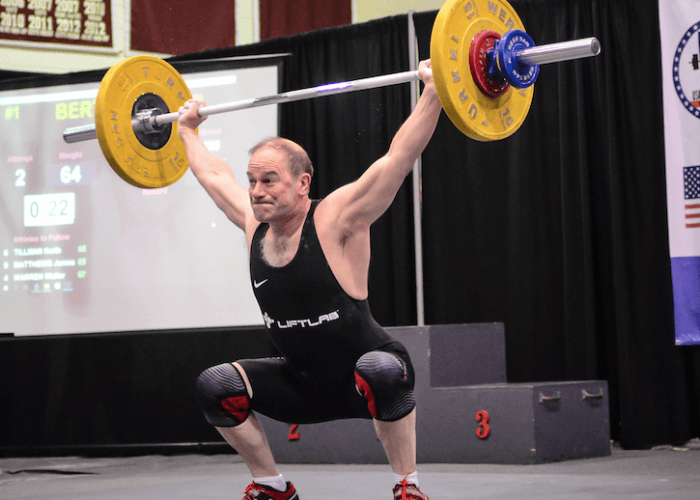
A new career as an Olympic-Style Weightlifter. Photo Courtesy: Loren Bertocci
I had coached a club team to ninth place at Nationals and hosted a national championship. I’d been region chair, zone chair—and that was by 1990. I stayed involved until 2004, deciding in 2004 that I had done enough. I officially retired off the FINA list in 2004.
Although I spent a couple a more years as the national referee chair for USA Water Polo, shortly after representing USAWP as National Referee Chair at the 2005 World Championships in Montreal, I decided that what it would take to do what I wanted to do—which was to stay involved but at the international level—would have required more time and energy than I was willing to spend. So, I retired from that as well.
Between 2007 and 2011, I stayed involved doing only two things: (1) actually refereeing at local events where long-time friends were hosting the events and (2) creating Water Polo Academy and teaching all USA referees via this online instruction paradigm. By the end of 2011, I simply became so busy in other aspects of my life that it made sense for me to completely exit from any further active involvement in water polo.
– Your wife Joan is renowned for championing polo, primarily through Water Polo Planet. How do the two of you connect through the sport?
She comes from a hockey family. Her father was a great athlete in two sports, baseball and hockey. Her brothers got to the point where they were at the Olympic tryouts for the famous Herb Brooks team in 1980.
 She started watching me referee, [and] it didn’t take her long to figure it out. Ultimately, the Water Polo Planet idea came up—she was sufficiently involved because of my involvement, and doing something in the back room setting made sense to her— on the condition that I post in the referee area because she thought water polo people might want to read some of my thoughts about the game.
She started watching me referee, [and] it didn’t take her long to figure it out. Ultimately, the Water Polo Planet idea came up—she was sufficiently involved because of my involvement, and doing something in the back room setting made sense to her— on the condition that I post in the referee area because she thought water polo people might want to read some of my thoughts about the game.
– Even though you weren’t at Stanford when he coached men’s water polo there, you have a strong connection with Dante Dettamanti, the Cardinal’s legendary men’s coach.
He was at Santa Barbara with another group of my friends—Greg Boyer and Pete Snyder [who] took over for Dante when he left for Stanford. Pete and I went to Stanford together.
I got to know Dante well only after he retired from coaching. While he was coaching, he was like most coaches, at war—to some degree—with the referees. It is rare for referees and coaches, in this sport anyway, to get along well if the referee is actually officiating the game the coach is coaching. There are a very few exceptions to that but normally you only get to be friends after at least one of you is done. Dante and I got to be friends after both of us were done.
The first in-depth contact I had with him was when he was in the process of writing a book—and if you’ve never read his textbook, you should. It is so full of information that it’s amazing. And I helped edit it for him. In the process of helping him edit it I read it.
[I thought:] Holy Mackerel! This is exactly the game that’s in my head. Dante’s game—the game that’s in my head, the game that’s in Mark Koganov’s head—and this is probably the place where I think it’s best to start. It’s a game that can be played equally well by big people and little people. The big people take advantage of the fact that they’re big, but they’re not so mobile because they’re big. And little people can take advantage of the fact that they’re mobile and quick, and they don’t have to be big.
In the NBA, the 7-foot center is not quick; the 6-foot point guard is. They can both play. But they don’t play the same way. That’s where we start. And there are some nuts and bolts components that are not necessarily obvious to most people, but I’m going to use a couple of examples to point this out.
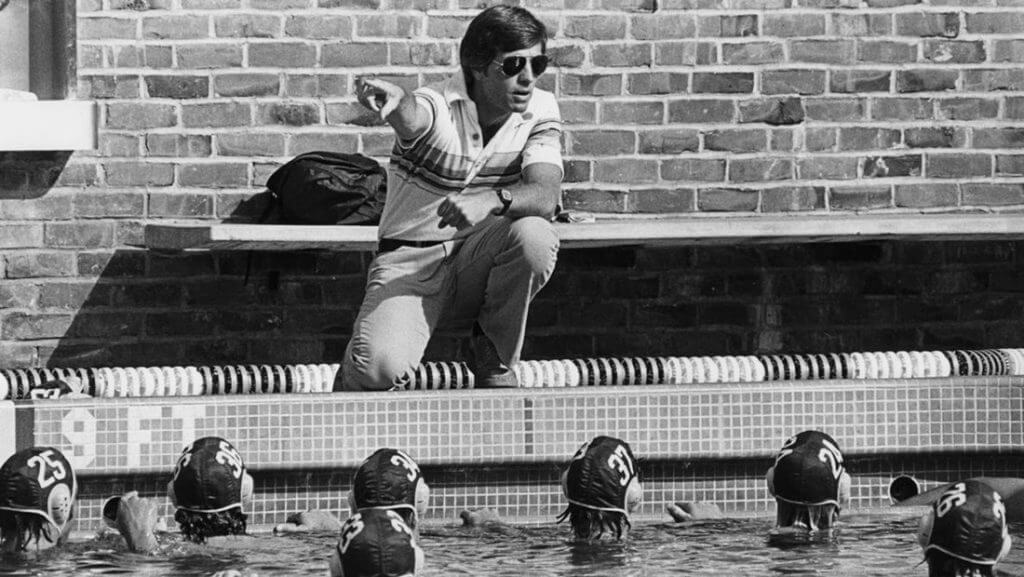
Dante Dettamanti in an undated picture. Photo Courtesy: Stanford Athletics
One of the fundamental issues that is a component of the game in my head is that, if it’s possible for the defense in a water polo game to stop the attacking team, playing one-on-one everywhere, the game grinds to a halt completely. Whatever the referees and the coaches do, it must result in the center being double-teamed. If the center is not double-teamed, you can easily grind the game to a halt on the perimeter.
As long as the referees—and I’m blaming referee instruction for this—as long as the referees allow the center defender to be sufficiently physical that they neutralize the center, and the defending team does not need to drop a second defender—you can suffocate the perimeter.
The second piece of that—and this is something when you talk about the advantage rule—let me give you a micro example of what advantage really means in this setting.
You are in possession of the ball on the perimeter and the defender does whatever defenders do, they go for the ball, they just go for the body, whatever. The referee dutifully calls a minor foul. The attacker gets the ball and gets back up on his or her legs. The ball’s now a meter further away from the goal than it was before the foul, so this benefits the team that committed the foul. Worse, during that period of time, the defense can re-position. Again, this benefits the team committing the foul.
That minor foul that we whistled in favor of the attacker, benefits the team committing the foul—mostly for positional reasons.
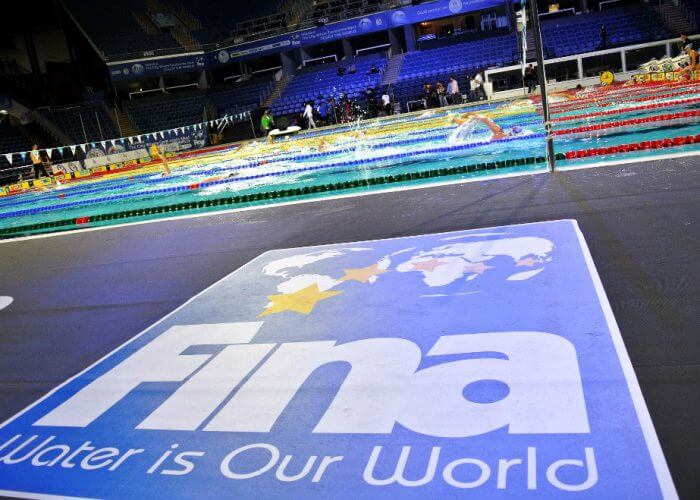
Photo Courtesy: M. Lapham
FINA’s response to this problem was to change the rules and allow the fouled player to take a direct shot. We’re now however many meters away from the goal. And then we don’t really stop the defense from interfering with the free throw because we don’t really believe in the direct shot—people are screaming [that] the defense should be able to continue to [defend]. We should argue that you just screwed up and that’s why we have a minor foul. Now that you were judged to be guilty, put your hands down and back away. If you don’t do that we’re going to exclude you.
That would change the entire equation – it would start to make it so painful for the offending team to commit such a foul that they would be less inclined to play that way. This would instantly open up the perimeter and make it possible for player and ball movement to occur.
It would be so easy to make this game work if they’d just change a few small things. This is but one such example.
– In a sport where 50-75% of player’s bodies are obscured by water, how is it possible for the average spectator to understand how the game is officiated?
My response is that’s a cop-out excuse used by people who don’t understand the game. Of course it’s all underwater! But, it doesn’t matter, and I’ll tell you why. The way the game ought to be is: the white team gets the ball and they go down to the other end, they shoot and score. Or they shoot and miss. Or they lose the ball. And by losing it, I mean that they threw (or gave) it to the other team.
Then the blue team gets the ball. They go down to that end. They shoot and score, they shoot and miss, or they lose the ball. And that’s what should happen. Nowhere in there should the referee blow the whistle and take the ball away from one team and give it to the other. Ever!
You may need to whistle a contra foul if in fact the thing that the attacking team did would have resulted in a goal that otherwise wouldn’t have been a goal. Or, if the thing they did was just so egregiously physical that you just can’t ignore it. But other than that, this what the game should look like: Go down to there and play, go over there and play.
Let me address why the underwater argument is inadequate. Let’s take the simplest possible example and that’s the center. The defender’s goal-side, the center’s ball-side, the center is at the 3M line. There’s an entry pass and the ball lands where it should land, half a meter from the center’s hand. And they’re all under water. And they’re probably holding each other. That’s the way the game’s played.
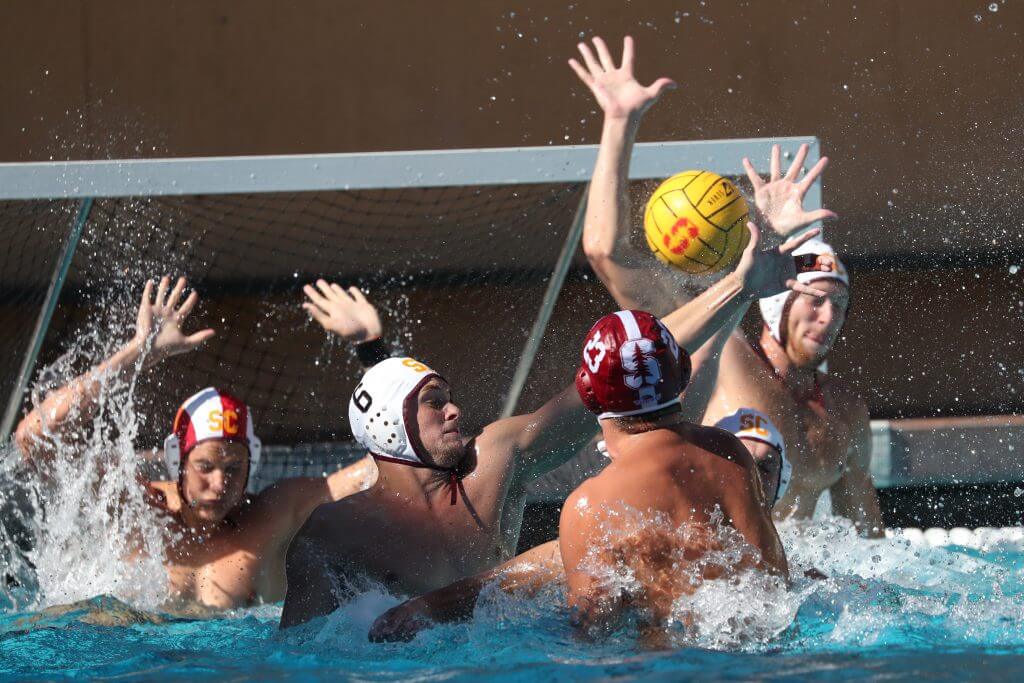
Stanford center Ben Hallock scores against the USC defense. Photo Courtesy: Catharyn Hayne
There’s only three things that can now happen. The center moves to the ball, picks it up and shoots it. And if that happens, then good. And that’s what you expect to see if the defender’s playing on the goal-side. Or, the center does not move for the ball. There are only three reasons the center would not move for the ball. One, he doesn’t feel like scoring—well I don’t think that happens very often. So the only two other reasons why the center’s not going to go for the ball; one, he’s being held. How do you know that? The ball arrives in a perfect position and the center doesn’t move for the ball, and you don’t see the defender’s hands. That’s an easy call. [The defender’s] out.
Or, he didn’t move for the ball because he’s holding the defender. He can’t move because he’s holding the defender. And, you know he’s holding the defender because you look at the defender and his hands are up. So now you don’t do anything and you let the second defender come in and take the ball and that starts a counterattack the other way.
What was going on under water doesn’t matter. The only thing that matter is what everybody can see.
– The game that you’re describing—going back-and-forth in the pool with no whistles—is exactly how FINA’s Andrey Kryukov described the game that he’s hoping to create by instituting new rules. Do you see an evolution for the game at this current moment?
The only hope for the game is Mark and Andrey. And they have enormous headwinds because, in order for them to make this happen, they have to disenfranchise a large number of powerful administrators and countries that have a stake in making the game remain the way as it’s been as they were recruiting and developing players. And they’re not going to go quietly into the night.
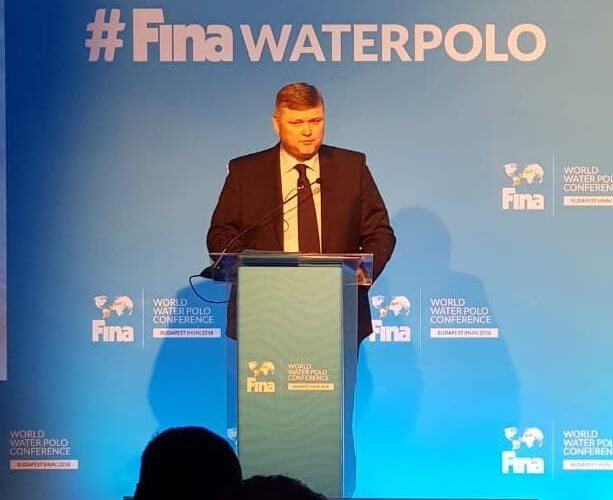
FINA’s Andrey Kryukov. Photo Courtesy: FINA
There’s no such a thing as a perfect game; you’re still going to end up with fouls called. The fouls that must be whistled are the ones that, in the absence of whistling that foul, the game doesn’t look like [ideal].
A simple example: the perimeter minor foul. A foul that really is a striking foul and not just a reach for the ball. If it’s a striking foul—which it usually is—that’s got to be an exclusion. We’ve got to stop players from doing that. If they don’t put their hands down and back away from the free throw, we have to exclude them for interference. And you know what will happen? They’ll either run out of players or they’ll change the way they play.
– From the spectator’s vantage point, are you saying that referees should be the sheriff on the pool deck, penalizing play by reducing rosters dramatically through exclusions?
The answer is: sort of. We know on average, because of the size of the goaltenders and the cleverness of defenders, they’re having a good day if—with the man advantage—you’re better than 20%. If you’re [at] 30% you’ve got a pretty good power play.
We also know that’s a much higher percentage of scoring than perimeter shots, but the percentage of shots made by the center that go in is better than that—something like 50%.
If the game is whistled correctly, the physicality at the center has got to go away. Back in the Ratko Rudic age, when I was refereeing [for] Team USA, he’d carry four or five center defenders. He was perfectly happy to let them keep fouling out as long as the other team’s center never scored. The way the game was played then, it was worth it for your center defenders to foul out if it kept the opposing center from shooting from right in front of the goal.
And if they don’t stop; no problem. They will end up playing five on six and will lose.
The problem is, we have these arguments and these instructions and—as an afterthought—an additional instruction comes from the evaluator: we don’t want everybody to foul out! Spectators want to see the best players.
You can’t have it both ways. If this is the game you want, it’s up to the coach to adjust. And if they don’t adjust, you know what? They lose. It’s a simple as that.
– Another facet of the new rules, only for the Olympics, is that the rosters are being reduced from 13 to 11 players. Going into a qualification cycle for the 2020 Tokyo Games is having teams playing short due to excessive exclusions a good look for the sport?
No, it will look terrible. but you know whose fault it will be? The coaches.
The eleven players [change]; that’s not because FINA decided it was a good idea. It’s because that’s the first step towards eliminating the sport. That’s a warning shot across the bow. It’s not 13 it’s 11 and next thing it’s going to be nine and next it going to be no sport. The decision-makers within water polo have got to figure out what to do.
Perversely, an 11-man roster will put even more pressure on coaches to adjust the way they play, which I think would be just fine.
I promise you, if you presented an 11-man roster and the referee instructions that I used to do at the Water Polo Academy—if you presented that to Dante, he would never have a team where too many players fouled out. He would never be playing five on six. Ever! He’d adjust his defense. And I know exactly how he’d do it.
He would be forced to play the perimeter four on five and work triangles away from the ball and one-on-one at the ball and drop somebody away from the ball in front of the center, back-and-forth.
Then when you do that, someone drops from the weak-side, it opens up a driving lane. That driver then has got to be smart enough not to drive into that person that just dropped to double-team the center. He’s got to go somewhere else.
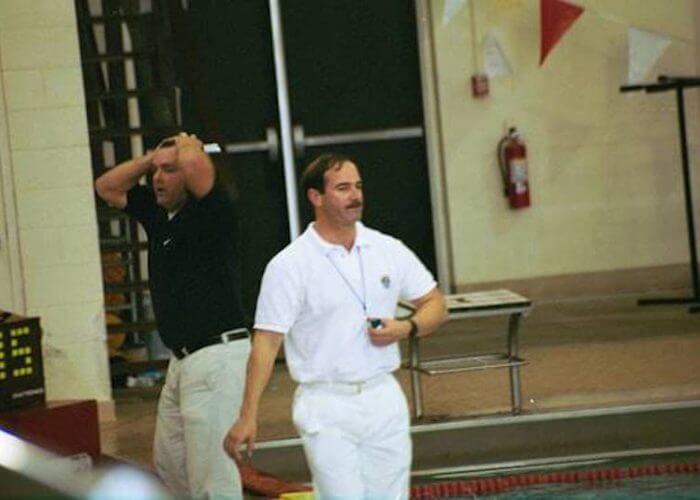
Bertocci and Luis Nicolao, undated photo
A good coach can say: Ah! I love this. I’m smarter than the other coach. And, if the game is sufficiently unphysical, now you can take advantage of your small and fast as lightening driver that no one can keep up with.
Now you’ve got a cool game.
At the international level, what should happen—somebody, Koganov [or] Kryukov says: this is the game. And it’s taught via some process.
Then the evaluators evaluate the game according to the instruction, and the coaches all know what’s coming—and they either adjust or they don’t. And if the coaches don’t know what’s coming it’s their own fault, because it ought not to be complicated.
And if you can’t change, you know what? You’re not gonna win.
– Again, this is very much like what I believe Koganov and Kryukov are preaching; if the coaches won’t change the game than the referees will.
The game that’s in my head, that’s in Mark’s head, that’s in Dante’s head, that’s what’s in Andrey Kryukov’s head—one that is spectator friendly. I’m not at war with coaches, I’m not at war with anybody here. What I want is a game where a non-expert can look and say: I sort of understand what’s going on.
The game I just described, if you’re a non-expert, what are you doing in the stands? You’re watching the ball. That’s where your eyes are. [If] you’re not a spectacularly high-level expert, every time a referee calls a foul away from the ball, there’s got to be some thought about: Is this referee a crook?
The only time a referee should whistle a foul away from the ball is in a situation where, if there’s video replay, anyone watching the replay will say “Oh, look what he did! Of course he should be excluded!”
If it’s not that bad, it should not be whistled, because it doesn’t matter. The fouls away from the ball can’t just be holding unless the hold prevents a driver from being able to insert motion into the offense. The fouls that must be whistled away from the ball are things such striking, kicking, misconduct, that sort of thing. It’s got to be something pretty bad.
[T]he contra foul called at the one position, when the attacker’s got the ball at the four—that doesn’t make sense. You just took the ball away from my team and gave it to the bad guys?! The non-expert (and often very partisan) spectator will be tempted to think that the referee must be a crook! This is the LAST thing the sport needs.
– Throw in the particular conditions that exist in pools on the East Coast and this is why there’s difficulties in refereeing polo in America.
There’s a couple of components to that. First, for the majority of the time I was any good as a referee, I was doing enough NCAA games that had a shallow end that you had to solve for the problem.
The problem is that water polo cannot be played properly in a shallow end. You must start from that premise. WP 20.5 makes it clear that it is a foul to use the bottom of the pool while taking any active part in the game. The game cannot be played in a shallow end. If it can’t be played in a shallow end, there aren’t a lot of things that happen next that should surprise anyone. The first one is: as soon as the attacking team uses the bottom to catch a pass or to shoot—it’s a turnover.
If the defensive team plants their feet on the ground to prevent the attacking team from moving, it’s (functionally) an exclusion (for holding). If the defender jumps in the air and lands on top of the attacker, it is an exclusion for (functionally) sinking or striking. [The referee] will have to keep doing that until they get their feet off the bottom.
What a good coach will do in that setting—and I’ve seen it happen many times, especially with coaches who knew me, because I would always take the shallow end. In my shallow end there will be no use of the bottom. A good team will go: Okay! At the shallow end where [Bertocci] is refereeing, our offense is going to be off the counterattack. Or, an outside shot. We’re not even going to put the ball into the center—because he’s going to turn it over.
So, a good team uses driving from the perimeter, and as soon as the defender puts their feet on the ground to hold the driver, they get excluded. [Now] it’s 6 on 5, and you’ve got to shoot from the top because it’s too shallow near the goal.
It’s not a perfect game but it’s a manageable game. No one cheats and—worse than that—no one with leverage and gravity with their feet on the ground can use that leverage to throw a punch and break somebody’s jaw; I have seen that happen several times and every time it was because of gravity and leverage. In the deep end there’s no leverage for that to happen.
– Are there challenges in this country because playing conditions between East and West are distinctly different?
No, a game played at Stanford looks the same as one played at Bucknell or Navy. It’s an all-deep 50-meter pool. There’s nothing magical about that. And there are some shallow deep small pools in California; all deep 50-meter pools are not everywhere.
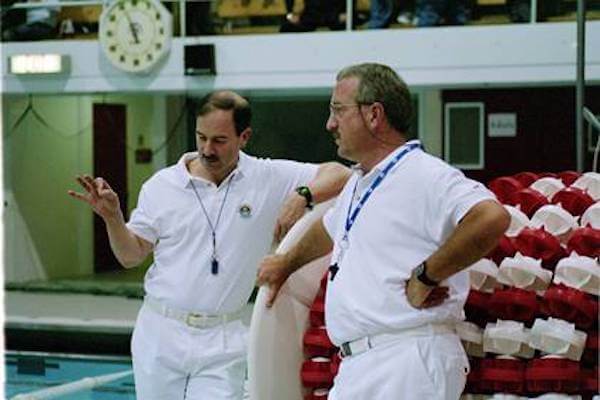
Bertocci and Brad Peavey in an undated photograph
The problem is, somebody in a position of authority has to say: In the shallow end, this is how the game will be refereed. We’re not going to allow you to be the Wild West. I remember doing a game once at Marist where the coach said: We talked to [unknown] who said because our pool’s too shallow the players can use the bottom here.
No. That’s not what the rule book says. [After protests] I said: I don’t make the rules! I’ll read it to you, and then I’ll enforce what’s written. [The rule book] says it’s a foul to use the bottom to your advantage if I see it happen I’m going to call a foul.
Bob Corb—or whomever is in charge at the NCAA level—[needs to say]: We’re either going to enforce this rule or not. And if you’re not going to enforce it then take it off the books.
– One point that Andrey Kryukov made is that—much like coaches—the more experienced and successful the referee, the less flexible that may be because of that success.
I disagree strongly. The best referees are the best because they have spectacular instincts and really understand the game. As the rules change—as they do every once in a while—a really good referee is going to adjust quickly. Really quickly. I’m talking about a matter of games.
– But it’s clear that any smart coach is going to adjust their strategy to take advantage of whatever calls the referees will give them.
I’ll give you an example of how that’s supposed to work. [The U.S. men’s team] is at the [2001] world championships in [Fukuoka] Japan—the one where Rudic was still suspended and Ricardo Azevedo was our head coach. As an international referee, one of my jobs is to scout the other referees. When I found out who was refereeing the next game that the U.S. would playing, I called Ricardo on the phone and said: These are the guys you’re going to get in your game, they are offensive foul machines. They love to take the ball away from the center and turn it over.

Bertocci and his “boys.” Photo Courtesy: Loren Bertocci
He said: Oh, okay. I’m not going to play my normal centers in this game, I’m gonna go with my little guys. It will look like they’re being beat-up and the [defenders] will be excluded and we’ll get a lot of 6 on 5s. So Ricardo took his three littlest guys, had them play center in the game—no contra fouls against the U.S. All kinds of defensive exclusions against whomever we were playing because they were big. The referees did just what I told Ricardo they’d do. [The Americans] adjusted and won the game. This is what happens when good coaches think and adjust.
– You have stated: “I have great fear that the sport is dead. I very much hope I am incorrect. VERY MUCH hope I am incorrect. But fear I am not incorrect.” How should this concern of yours be interpreted?
My fear is that, unless the way the game is whistled changes, so that [referees] enforce the game that’s in Dante’s head and in my head, in Mark head and in Andrey head, you’ll get continuous bleeding of spectators and—if the only people who get to play this game are people that are 6-3 and bigger who came up the line in Croatia, Serbia and so forth—the Japanese can’t play, the Americans can’t play, the Brazilians can’t play. Now we have a game where it’s not world-wide anymore; we know the IOC doesn’t like sports that are not world-wide. They don’t like sports where only one or two countries from one part of the world win.
Until we make these changes, so that the game is watchable and understandable to a non-expert—and really only the stuff with the ball should be called—and it’s not too physical so that people don’t get beaten up, and little people who are quick can take advantage of their speed…if that all happens? [Polo’s] gonna thrive.
If it’s not, it’s going to continue its death spiral.




Losing Loren was a big blow to water polo. I think that he was frustrated by the inadequate rules of the game, and the way that they are being enforced. The way the rules are written should dictate how the game is played. The problem with water polo is that the rules are poorly written, and everyone interprets them in a different way. The ones that don’t work should be eliminated and we should add rules that reflect how we want the game to be played. This is what the TWPC and FINA will try to accomplish in the next 6 years in order to make water polo a more dynamic game that can be played by everyone around the world, and not by just a few select European countries of 6’8” giants.
In my opinion, the biggest problem in our sport is FINA Rule 7.3 (Advantage rule), the automatic exclusion on a static center who just sits there with the only purpose of getting his defender excluded from the game for 20 seconds. As long as this rule exists, all coaches will want to do is plant their biggest player in front of the goal and try to draw an exclusion foul so that they can play with an extra man. This is boring as heck to watch, because this is all that most coaches do.
The game has no movement, no counterattack and no driving to the goal. Can you imagine basketball planting a 7-foot center under the basket, and every time he gets the ball, the defender fouls him so he can’t shoot, and then in addition gets excluded for doing that. Then add no driving to the basket and no fast break, and you have a boring game of basketball.
We need to play the game more like basketball and initiate a 3-second lane rule so that the center has to move when he/she is between the goal posts. Until we do that by changing the rules, the game is finished; without any semblance of the dynamic game that is necessary to appeal to the masses. Coaches are the sport’s worst enemies. Coaches could initiate a movement game if they wanted to; but all they care about is getting the ball to the center to get the center defender excluded from the game. In other words, they are taking advantage of the rules as they are poorly written.
The other biggest problem in water polo is the fouling and the whistles. In water polo, players foul at will, anytime they want to and anywhere in the pool. The result is 100 whistles or more in a one-hour game. The reason for this is that the punishment for fouling does not fit the crime. A defender can foul anytime he wants to in order to prevent a shot on goal, because the player fouled cannot shoot the ball after he is fouled.
The only penalty for fouling (except on the center) is the awarding of a free pass to the player fouled. The rule for fouling has to be changed so that the penalty is harsh enough to keep players from fouling. Loren is correct. The game should flow. There should not be a whistle called every time someone touches the ball. I won’t even get into the constant holding that goes on underwater.
Loren was also right when he said “Bob Corb—or whomever is in charge at the NCAA level—[needs to say]: We’re either going to enforce this rule or not. And if you’re not going to enforce it then take it off the books”. However, this is not Bob Corb’s fault; it is the fault of the NCAA for adopting rules that don’t make sense and cannot be enforced. I will give you an example.
The NCAA Rules committee, in their infinite wisdom, approved a new water polo rule this year that makes SIMULATING A FOUL an exclusion penalty. A defensive player whistled for simulating a foul will be excluded from play for 20 seconds. An offensive player called for simulating a foul will lose possession of the ball to the opposing team.
This is a rule that cannot be enforced! In fact, in 30 games that I have watched this year, I have not seen this rule called one time. When in fact, players fake (simulate a foul) on almost every play. Offensive players fake in order to “draw a foul”, and defensive players fake to draw an offensive foul (like charging in basketball).
If referee’s wanted to, they could call this rule on almost every play in the game. As a result, they end up not calling anything. In fact, the referees actually end up encouraging players to fake. A player with the ball will purposely drop the ball and fake as if he has been fouled, sometimes when the defender is not even touching him; and the referee calls the foul and awards the offensive player with a free pass. Talk about a rule that cannot be enforced. This one definitely should go.
It is encouraging to me that FINA will attempt to do a major re-write of the water polo rules in the next few years. Loren and I should be on that committee.